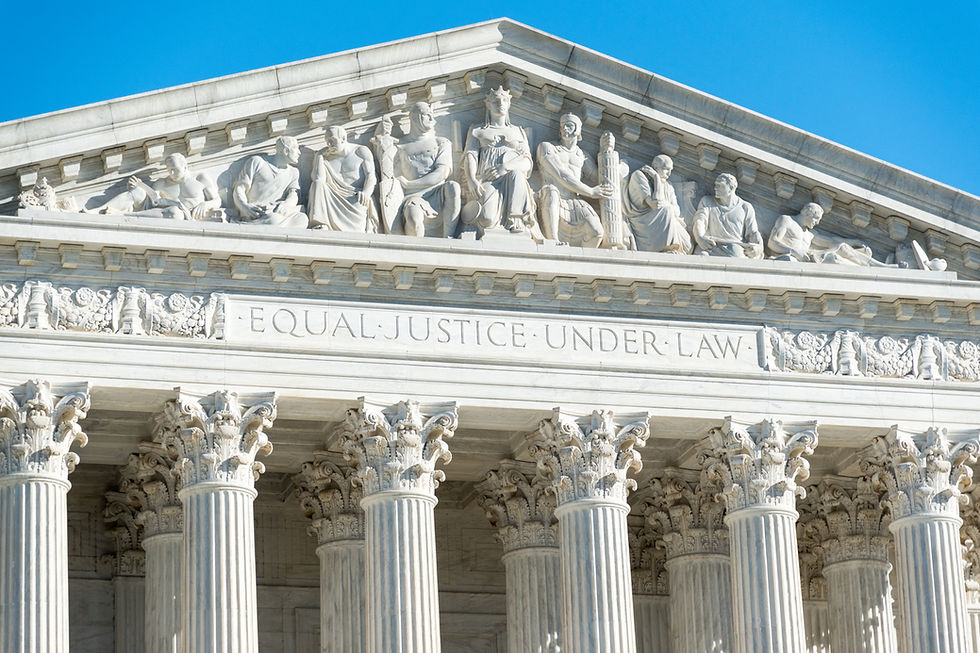Achieving Standing . . . The Holy Grail in Election Integrity Legal Battles
- Sep 30, 2025
- 3 min read
SCOTUS to hear oral arguments next week


By Elizabeth Dallam-Ayoub, MFEI Guest Commentator
[Editor's Note: On October 8, the United States Supreme Court will hear oral arguments in Bost v. Illinois State Board of Elections. A key legal concept being litigated is "standing." Many courts never examine election-related cases and evidence because they rule the defendants do not have "standing." Bost v Illinois could . . . finally . . . break through that barrier. Here is an explanation of this important legal term.]
For those of you who played as a child the game, “Mother, May I?” you might recall the most important rule: you could not move unless Mother gave you permission. As in all games, there are rules; and those rules are sacrosanct.
In a rudimentary manner, a federal candidate, U.S. Congressman Mike Bost, is now asking the Supreme Court of the United States (SCOTUS) for permission, permission to “reach” (or “approach”) SCOTUS and be given the right to argue an election integrity issue. To “ask permission” of a court (namely, the United States Supreme Court) to be heard is what is called “standing.”
“Standing” is a legal term of art which means the person wanting to sue someone in court is the appropriate person to bring an issue to the court. It is a legal “rule of the game,” meant to ensure that every lawsuit can be fairly decided.
Standing means that the person bringing the lawsuit is the proper and appropriate person to bring the case before the court. Imagine if a roofing contractor, whom you have paid, abandons the job without finishing the installation of your new roof. Next imagine your neighbor feels sorry for you and sues the roofing contractor. That neighbor has no vested interest in the case – no standing. But imagine if you have given control of your finances to a guardian, could the legal guardian sue the roofing contractor? It most likely depends, because just as in sports and other games, there are some calls or decisions that are not necessarily easy. If the legal guardian files a suit against the roofing contractor, the legal guardian most likely will have to prove to the court they have standing. Before you can ask the court to decide if the roofing contractor failed, you must first say: “Court, may I? Court, may I proceed with the lawsuit?”
On October 8, 2025, individuals who were candidates for federal positions are asking the court if they have standing to bring before the court the issue of whether they are allowed to file a lawsuit about an election integrity issue. They will make an erudite legal argument as to why they are the appropriate individuals to do this, why they have “standing.” This oral argument will be heard by SCOTUS. Michigan Fair Elections will be reporting on the arguments made and the questions the Justices ask.
Standing, it seems, should be a rather simple answer. The fact that since 1974 SCOTUS has ruled on four cases about standing demonstrates it is not a neatly-packaged question. SCOTUS has given a few legal requirements to further define standing. It mandates a person who wishes to pursue a lawsuit before the court must have an “injury in fact.” In other words, the person wishing to sue the roofing contractor must have been personally injured. While you, the homeowner, would be injured, the legal guardian might not have been injured, right? As for your neighbor, no way!
The second legal requirement is that there be a causal connection between the injury and the conduct before the court. This often can be a murky issue. The person wishing to bring suit must be able to say: “Because Person A did this, I have this specific harm/injury that nobody else has and it is only because Person A did this.” Returning to the roof scenario, the neighbor could never say this. The guardian . . . perhaps. Think about if the guardian is responsible for making sure you have enough funds to last for the rest of your life.
The third legal requirement is there must be “redressability.” In other words, after the case is concluded, will a favorable decision make this injury right? In the roofing contractor illustration, imagine your home had either been demolished by a tornado or that you sold the house without a new roof? The court’s time/money/resources — which are, after all, public monies — would have been spent for naught.
In Bost v. Illinois Board of Elections, whose arguments will be heard by SCOTUS on October 8, Michigan Fair Elections Institute will be hoping when the federal candidates say, “Mother, May I proceed?” SCOTUS will say, “Yes, you may.”
Elizabeth Dallam-Ayoub formerly practiced law in the state of Michigan and is a guest contributor on legal issues for Michigan Fair Elections Institute.










Comments